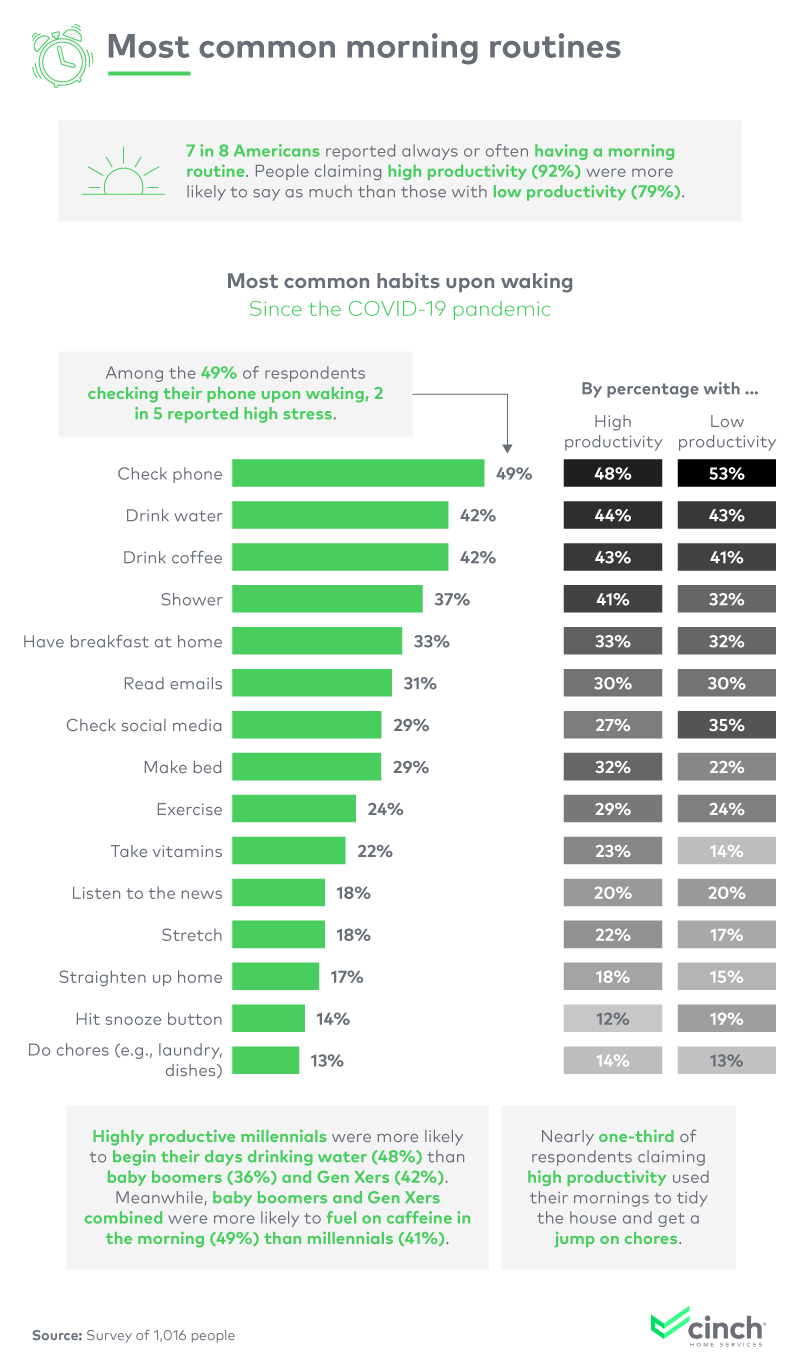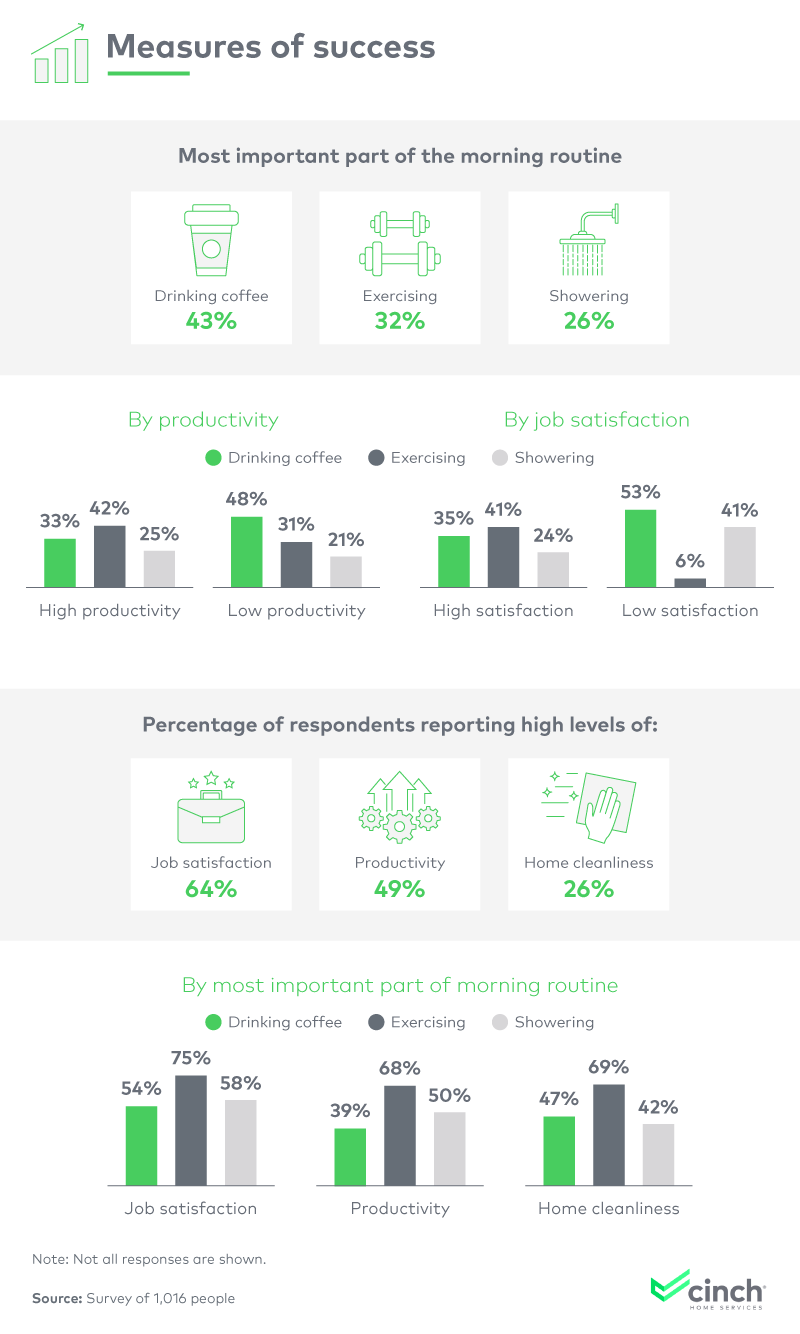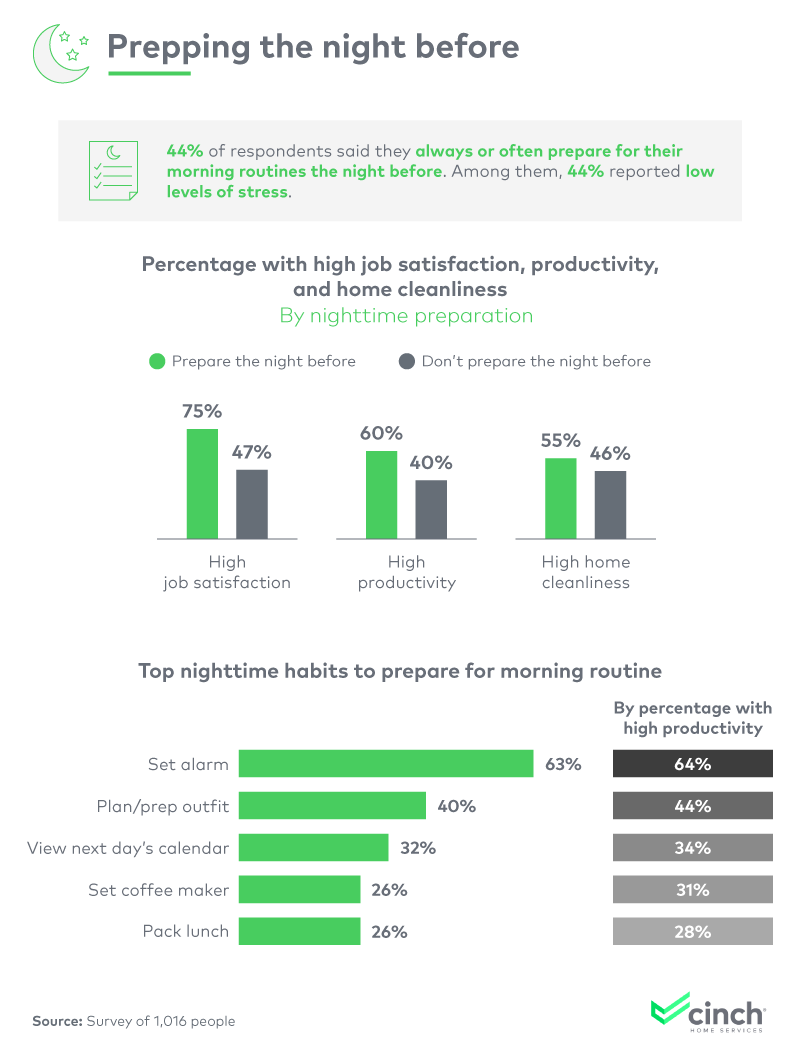Are you setting yourself up for success from the very start of the day? [Study]

Forty-three percent of Americans said they view drinking coffee as the most crucial part of their morning routine, followed by exercising (32%) and taking a shower (26%).
88% of people always or often have a morning routine. Among them, highly productive people (92%) were more likely to do so.
Among people preparing for their morning routines the night before (44%), more than 2 in 5 report low levels of stress.
Morning habits that set you up for a good day
Whether you’re looking to be more productive, get healthier, or just start the day in a generally better mood – the secret key to success might not actually be so secret. The benefits of establishing an effective morning routine have been well documented, and whether you’re interested in some of the more extreme morning habits of the uber famous or rich, putting together your own morning rhythm can be an important part of setting and meeting your goals.
In 2021, the benefits of actually creating and sticking with a morning routine might be even more important than ever. For the millions of people who will continue to work remotely or hybrid, it can be easy to fall out of habit with even the most fundamental morning tasks. When it feels easy to simply hit the snooze button a few more times and roll out of bed at exactly the moment your day should be starting, you could be doing more harm than you realize to your cognitive process and energy levels.
Without trying to emulate what’s trendy, we asked Americans what kind of morning routines they’re currently implementing, and what’s really working for them. Read on as we explore which early morning actions make people feel the most productive throughout the day; what single action people see as being the most important to their morning routines and how other factors (including job satisfaction and home cleanliness) might also be impacted by what we do when we get out of bed.
Roused and ready
Jennifer Aniston wakes up at 4:30 a.m. to drink hot water with lemon, and Oprah Winfrey wakes up before 6 a.m. (even though she doesn’t believe in alarm clocks) to take her dogs out, but you don’t need to go to these extremes to set a morning routine that works. Among the more than 1,000 people surveyed, 7 out of 8 said they always or often adhere to a morning routine. Those with a morning routine were also more likely to consider themselves highly productive (92%) than those without one (79%).

So what are the most common morning habits people have picked up since the start of the COVID-19 pandemic? Forty-nine percent of respondents indicated they check their phones just after waking up, followed by drinking water (42%), drinking coffee (42%), and taking a shower (37%). While the temptation to check your email or social media first thing in the morning can be overwhelming, especially if your phone doubles as your alarm clock, studies show early-morning phone activity can lead to higher levels of stress and lower attention spans. People who reported checking their phones first thing in the morning were more likely to indicate lower levels of productivity (53%). Drinking water right after waking up was tied with drinking coffee, but it’s the H20 that’s been shown to help boost mood and improve cognitive function in the morning.
Of course, feeling productive in the morning isn’t just about getting more done at work. Nearly a third of people surveyed who reported feeling highly productive after waking up used their mornings to clean up around the house and to get a head start on their chores, including doing laundry or taking care of the dishes.
Benefits of an effective morning routine
For many people, early mornings are synonymous with a fresh cup of coffee. It can be tempting, especially if you don’t always wake up feeling energized and ready to take on the day, to do anything but gravitate to the biggest source of caffeine in your life – but this isn’t exactly in your best interest. As with anything, too much coffee inherently isn’t good for you, but drinking it first thing in the morning increases cortisol, which can have a negative impact on hormone balance, weight and gut health.

Forty-three percent of Americans said they view drinking coffee as the most important part of their morning routine, followed by exercising (32%) and taking a shower (26%). Among those with lower levels of productivity, 48% said they considered coffee the most important part of their mornings, as did 53% of people who indicated they weren’t satisfied with their job.
Exercise was the standout aspect of morning routines among people who were happy with their job (75%), considered themselves highly productive (68%), and considered their home squeaky clean (69%). If you’re thinking about putting in the effort to burn calories first thing in the morning, you’ll likely get more out of it than a smaller waistline. Studies show exercising, especially in the early morning, can make you more alert, boost your energy levels and help you focus.
When it comes to stress, just 2 in 5 respondents rated their stress levels low upon awakening, a position that was higher among those who shower first thing in the morning (47%) versus exercise (41%) or drink coffee (43%). Among nearly half of respondents who checked their phones right after waking up, 2 in 5 acknowledged having high stress.
Setting yourself up for success
Establishing an effective morning routine isn’t always about what you do after waking up, it can be about the things you do before going to bed too. Forty-four percent of respondents said they either always or often prepared for their morning routine the night before, and among those, more than 2 in 5 also reported having lower levels of stress. Seventy-five percent of people who prepared for the morning before going to bed said they were happy with their job, 60% felt they were productive and 55% indicated their home was clean.

So how can you get a jump start on tomorrow before falling in between the sheets? The most popular habits to prepare for the morning ahead included setting an alarm (63%), planning or preparing what to wear the next day (40%), looking at the next day’s calendar (32%), setting the coffee machine (26%) and packing a lunch (26%). Among those surveyed, respondents earning $66,000 and over (49%) were more likely to always or often prepare for their mornings the night before versus those earning less than $66,000 (45%).
Maximizing your time
If you want to get the most out of your day, it’s clear you should have a morning routine. As we found, the kinds of habits you establish in the morning can help you feel more productive during the day, feel happier with your job, feel less stressed, and aid in getting more done around the house. Instead of reaching for the coffee cup when you roll out of bed, consider jumping in the shower or going for a quick walk around the block instead. Exercising is more likely to help you feel energized throughout the day and can also help increase cognitive functions.
At Cinch Home Services, we know your mornings don’t always leave time to deal with faulty or defective appliances. With the Cinch protection plan, our affordable, award-winning home warranties will help you control the costs of unexpected breakdowns and streamline the repair or replacement process. With coverage for everything from plumbing to knobs and doors, our digital dashboard will let you request service 24/7 from anywhere you are. With Cinch, when something stops working, we send a verified service professional out to fix it, and our team takes care of the rest. Visit Cinch online today to learn more.
Methodology and limitations
We surveyed 1,016 people on their morning routines. Among them, 53% were men, 46% were women, and 1% preferred not to answer. Respondents’ ages ranged from 24 to 64 years old with an average age of 38.
For short, open-ended questions, outliers were removed. To help ensure that all respondents took our survey seriously, they were required to identify and correctly answer an attention-check question.
These data rely on self-reporting by the respondents and are only exploratory. Issues with self-reported responses include, but aren’t limited to, exaggeration, selective memory, telescoping, attribution, and bias. All values are based on estimation.
Fair use statement
Already thinking about your to-do list tomorrow? Plan ahead to share out this study for any noncommercial use with the inclusion of a link back to this page so your readers can see our full findings and survey methodology for themselves.



